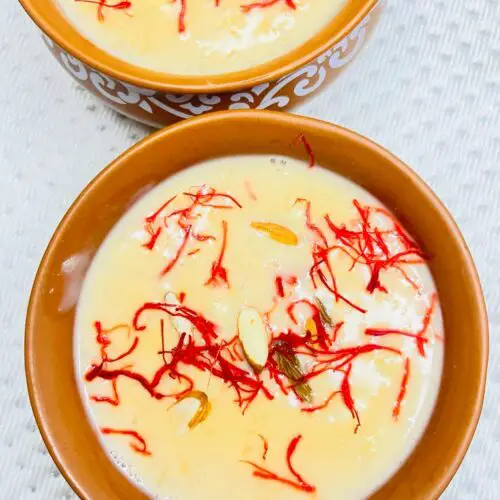Kheer Recipe Card
Special Kheer is a beloved dessert of India and made with milk, condensed milk, nute and saffron on top makes it more delicious. Soo easy recipe to make.
Equipments
1 Boiler
Ingredients
- 1 litre Milk
- ¼ cup Rice (raw grain)
- ¼ cup Almonds
- Sugar as required
- ¼ cup Raisins
- 4-5 Green Cardamoms/1teaspoon cardamom powder
- 200 ml Condensed Milk
Instructions
- Begin by washing 1/4 cup rice thoroughly to remove any impurities. Keep in mind that rice should be half cut, don't use basmati rice in kheer. 2. Then, soak it in water for about 30 minutes. This step ensures even cooking and a creamy texture.3. In a heavy-bottomed pan, bring 1 litre milk to a gentle boil. Stir occasionally to prevent it from scorching.4. Drain the soaked rice and add it to the boiling milk. Lower the heat to a simmer and cook until the rice is soft and tender. Stir occasionally to prevent sticking.5. Once the rice is cooked, add sugar as required, 3-4 green cardamoms and 1/4 cup chopped almonds.6. Afterwards append 1/4 cup raisins in to the kheer. Stir well to combine all the ingredients.7. Add 200ml condensed milk to give extra taste and thicken the kheer.8. Allow the kheer to simmer on low heat for another 15-20minutes, stirring occasionally. This slow cooking process allows the flavors to meld together, and the rice to absorb the milk, resulting in a thick and creamy consistency.9. Once the kheer reaches the desired consistency, remove it from the heat. Garnish with a sprinkle of chopped nuts, saffron strands or rose petals for an elegant touch. Serve warm or chilled, depending on personal preference.Your Delicious Kheer is ready
Video
Notes
- Make sure to soak the rice before cooking helps in achieving a softer texture and even cooking.
- Full-fat milk is recommended for a rich and creamy kheer, but you can use low-fat milk as well.
- Slow-cooking the kheer on low heat allows the rice to cook evenly and absorb the flavors of the milk.
- Aromatic spices like cardamom, saffron, and rosewater enhance the flavor profile of the kheer.
Nutrition Facts
Kheer Recipe Card
Amount per Serving
Calories
140
% Daily Value*
Fat
3
g
5
%
Saturated Fat
1
g
6
%
Cholesterol
1
mg
0
%
Sodium
2
mg
0
%
Potassium
90
mg
3
%
Carbohydrates
26
g
9
%
Sugar
17
g
19
%
Fiber
1
g
4
%
Protein
2
g
4
%
Vitamin B1
1
mg
67
%
Vitamin B2
1
mg
59
%
Vitamin B3
1
mg
5
%
Vitamin B6
1
mg
50
%
Vitamin E
1
mg
7
%
Vitamin K
1
µg
1
%
Calcium
11
mg
1
%
Vitamin B9 (Folate)
3
µg
1
%
Iron
1
mg
6
%
Magnesium
18
mg
5
%
Phosphorus
49
mg
5
%
Zinc
1
mg
7
%
* Percent Daily Values are based on a 2000 calorie diet.
Tried this recipe?Tag@northindiankitchenn on Instagram
